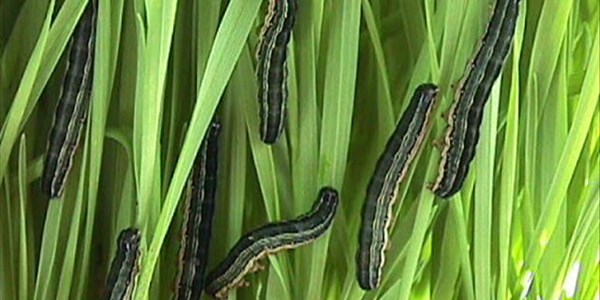Agriculture
Landbounuus-podcast: Scientists deployed to asses African armyworm outbreak─── CHRISTAL-LIZE MULLER 13:15 Thu, 20 Feb 2020

The Department of Agriculture and Rural Development has deployed its scientists to the Salpeterpan Farm at Soutpan to continue assessing the level of infestation following an African armyworm outbreak on the farm.
This is according to Zimasa Leputla, spokesperson for agriculture after the outbreak was discovered on the farm. She says teams will also visit neighbouring farms to see if the outbreak has spread. According to her the thorough assessment will assist in determining what control measures can be put in place. The Africa Armyworm tends to be devastating for farmland and pastures.
Meanwhile, the Agricultural Research Council, ARC, says the African armyworm, also known in Afrikaans as kommandowurms, which march along grounds, causing wide-spread damage to grasslands, remains a huge challenge. Dr Roger Price, research team manager at the ARC's plant health protection, says the council wants these worms to be legislated to be a national pest as the damage it causes is huge. Good breeding conditions - including rain at the right time, grass quality and winds concentrating the moths in their breeding sites up in central Africa - make outbreaks of the African armyworm difficult to control. Price says it is also difficult and uneconomically to control outbreaks in South Africa because pesticides have to be sprayed over large grass areas.
Still with armyworm outbreaks... There is currently a Fall Army Worm outbreak in Limpopo and Mpumalanga. This type of worm, which is relatively new pest in South Africa, originates from the central part of South America. It is an invasive pest on maize and sorghum in South Africa and is of economic importance. Research Team Manager at the Agricultural Research Council, Roger Price, says the pest, which settled all over tropical and Eastern Africa, is here to stay.
AND
Agri SA has welcomed the Western Cape High Court’s ruling in a matter concerning the Philippi horticultural area and the impact of a proposed residential development on one of Cape Town’s crucial underground aquifers. Judge Kate Savage earlier this week ruled in favour of the Philippi Horticultural Area Food and Agricultural Campaign, that is dedicated to stop the development of 479 hectares of land owned by the Oakland City Development Company. The court ruled key factors concerning the impact of the development on the aquifer and on climate change and water scarcity had not been taken into account by the involved provincial department. Agri SA's Janse Rabie says decision-makers must take the country's underground water resources into account when deciding to allow residential and industrial developments in agricultural areas.
OFM News













